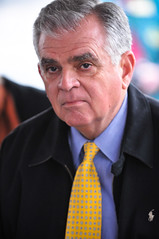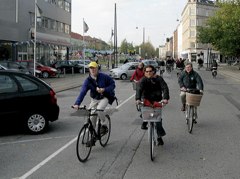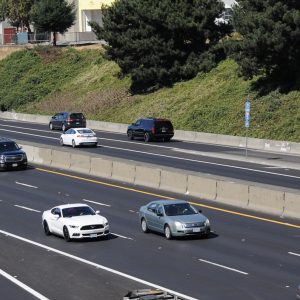
an FHWA program that
sent Americans overseas
to learn transportation
best practices.
(Photo © J. Maus)
After ABC News questioned spending on a trip to Europe by American bureaucrats to study outdoor advertising practices, U.S. Department of Transportation Secretary Ray LaHood has suspended all funding for the FHWA’s International Technology Scanning Program.
That program has funded many transportation policy-related trips over the years, including one that looked at European biking and walking safety and mobility practices in 2009.
In May 2009, 12 transportation experts visited five countries in Europe to glean lessons on how to improve biking and walking safety and mobility. Among the officials on the trip was Oregon’s former state traffic engineer Ed Fischer (now retired). We reported on that trip and linked to their final report, Pedestrian and Bicyclist Safety and Mobility in Europe back in September.
Other international scan trips have focused on everything from pavement technologies and bridge construction methods, to sustainable transportation practices and congestion pricing.

Rob Burchfield riding in
Copenhagen in 2008.
(Photo: Mikael Colville-Andersen)
Exchanging knowledge of best practices is common in American bike planning and policy circles. National bike industry supported non-profit Bikes Belong has their own “Best Practices Program” which lists “study tours” to foreign countries as one of their key areas of focus.
Portland planners, experts, and elected officials have made several trips to Europe over the years to better understand bike policies. In just one example, Metro hosted a week-long trip to Amsterdam and Copenhagen for their Blue Ribbon Committee on Trails back in 2008.
Sec. LaHood’s office told us this morning they are simply acting on President Obama’s orders. Here’s their official statement:
“The President has been clear: we must get rid of stupid spending and pointless waste. Each taxpayer dollar is precious, and there is no excuse for wasting a single one. That’s why, as part of the President’s Campaign to Cut Waste, I have suspended this program. I have directed the Federal Highway Administration to shut down this program until further notice while I personally review the way taxpayer dollars have been spent. From the outset of this administration, I have urged agency personnel to be judicious and cost-conscious in the use of official travel and we will not tolerate any abuse of the public trust.”






Thanks for reading.
BikePortland has served this community with independent community journalism since 2005. We rely on subscriptions from readers like you to survive. Your financial support is vital in keeping this valuable resource alive and well.
Please subscribe today to strengthen and expand our work.
“…we must get rid of stupid spending and pointless waste.”
Ok, how about getting rid of the CRC then.
And military intervention on every corner of the planet?
Learning from other countries is not “stupid spending and pointless waste”. It is necessary and important for our countries growth and prosperity. The world is getting smaller and we have much to learn from what others are doing.
In fact, here’s a blog of a UO Professor doing just that thing right now in Amsterdam.
http://2011bikesabroad.blogspot.com
I personally have been inspired and helped by the scan tours you mentioned in this article. Expanding our knowledge is fiscally sound and smart!
I agree that we should be learning from other countries, but in this age of information technology, there may be smarter ways to do so. Would you rather they spend a $50,000 to send a group of traffic engineers to Amsterdam for a week, or spend that $50,000 creating bike lanes in our community?
Not all good ideas were dreamed up in the USA. There’s a point to having experts in a field travel to see what their distant colleagues have done elsewhere, so long as the trips are real study trips and not junkets. From what I heard, the bike-ped folks actually worked on their trip. Does ABC assert that the billboard study would be any less productive or was it simply a simple top-of-the-head reactive piece?
The outdoor advertising control project would have helped FHWA and state DOTs develop a better cost-accounting approach for their outdoor advertising control programs. In other words, it would have ultimately helped DOTs devise a way to appropriately assess billboard permit fees so that they could be sufficiently regulated without limiting free speech…..things other countries have done more successfully than the financially constrained state DOTs. Seems hardly a “stupid” international “scam.”
So it’s okay to travel to a foreign country to waste billions of dollars to blow it up so you can make them so mad at you that you can justify blowing it up for a dozen more years; but not to see how Europeans have saved their highly profitable tourist attractions from the ugly scourge of billboards.
Yeah, like Chad said, I’d just as soon have them keep sending transportation officials to Europe to learn how to get people out of cars… and stop funding highway megaprojects like the CRC!
Ted Buehler
But but but… I need the $60,000 parking spot to park my $20,000 car so I can… take the $2.50 trip bus across the river into Portland… hmmm… something isn’t adding up here…
I have actualy used information from the FHWA’s International Technology Scanning Program. While the program could be abused to take vacations to Europe, the information collect is valuable. Europe is far ahead of the US in transportation revitalization. Instaed of throwing out the program, through out anyone that abuses the program.
They spent $300,000 on this trip, including luxury hotels and lavish meals. To study billboards. Now, in the scope of the national budget, this doesn’t even qualify as pocket lint. But still — pretty damn bad judgment in this economic climate.
Look after the pennies and the dollars look after themselves.
Too many times you hear “it’s only $1m, that really isn’t much”.
Well if we cut out those wasteful $1m projects we could move on to the wasteful, $2m projects.
No waste is too small to eliminate.
While active duty in the 90s the US Air Force, and I can only assume the other branches as well, had a program encouraging innovation of processes and material that saved the military money by giving the inventor a cut of the overall savings.
Small though it was without this simple profit motive inside an organization that doesn’t think of profit we had seen many decades of stagnated wasted action because there was little impetus to change, maybe we should apply this idea to government budgets.
Instead of encouraging wasteful spend at the end of every fiscal cycle so that an organization will at least get the same budget next year to be able to ride out unplanned expendatures every sub unit needs to have access to their own emergency account. By having a source of revenue for the unforseen there is a chance that government orgs will consider reducing wasteful spending.
Include twice over accounting, both from an internal and external accountant, audits that flag spending that doesn’t contribute to accomplishing mission goals. If some one can show waste and demonstrate how its elimination does not affect mission accomplishment they would get a cut of the savings. This apply to both internal personnel and external accounting agents.
By applying limited profit motive to government waste we will make a gainful investment in reducing bureaucratic inefficiency.
It was $1.2M over 10 YEARS. That’s just over $100,000/year. Do the math. It’s nothing. Billions are lost in domestic congestion everyday.
LaHood unnecessarily threw this under the bus.
How is it that funding for studying transportation is in the same pot as studying advertising? Makes no sense to me.
State DOTs regulate roadside advertising. That’s how.
There is already a load of information, studies, and first hand accounts of European traffic infrastructure to make decisions and adapt them to our transportation systems. Personally, I see most of these trips as mostly taxpayer funded vacation junkets for bureaucrats and elected officials.
Crowdsourcing the existing knowledge base on these topics would be far more efficient and cost effective.
Brad,
I hear you, but the valuable thing about these trips isn’t just the technical information itself. The real value comes from having bureaucrats with a U.S.-centric transportation perspective see how things are done in Europe. I’ve seen it happen many times when people come back energized and excited and eager to share new ideas and see how they can work in a U.S. context.
These types of trips will continue to happen, cities and agencies will just have to find another way to fund them.
I would listen to this popsquat concern if they would only STOP the CONSTANT WAR. Doesn’t anybody even care? I am not being political, merely economic. One month in Iraq, nine BILLION dollars. And they want to cut grandma’s medicare?
One person’s popsquat war is another’s patriotic crusade for Truth, Justice and the American way.
Don’t make right, it simply is. That pesky right to believe something no matter how unfounded in reality it might be can be inconvienient.
The savings from cutting spending such as this amount to a few rockets and bombs in our seemingly endless muddling in other countries’ affairs. (Most recently Libya.)
Healthcare is suffering. Our educational institutions are under economic siege.
“Cutting stupid spending” indeed. How about stupid spending cuts.
I don’t know about the billboard program, and maybe some review of accountability is needed, but I do know first hand that studying cycling infrastructure in Europe absolutely requires that you be there, and that you walk and bike and take public transit in person. So much of transportation choice involves how it feels — it’s partly psychological — and you can’t really understand what feels safe or enjoyable or confusing or scary or comfortable without actually putting yourself on the ground and experiencing it first hand.
Or to put it another way: do we want bureaucrats making decisions about how we get around town based solely on manuals and theories, second hand reports and conventional wisdom — or do we want them to also have actual, practical, first-hand user experience with the various options and facilities they’re designing?
Until I went to Europe and biked along some of these corridors to schools and shops and so on, I didn’t fully understand, in more than an abstract why, exactly why so many more people in certain cities chose to cycle for their daily errands. I also returned with a much better idea of what would and wouldn’t work here, and what sorts of options were available to adapt to our streets.